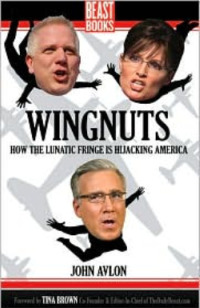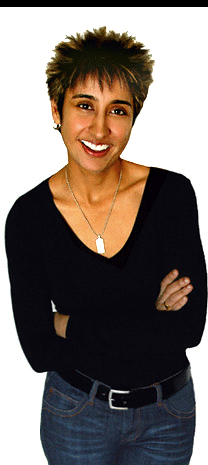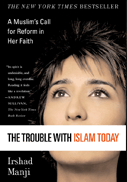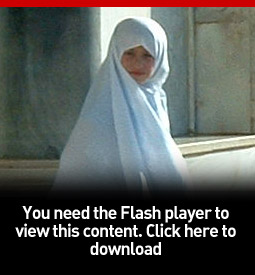
Now that Pope Benedict is making public amends for the long-percolating sex abuse scandal inside his worldwide Church, all sorts of commentators are weighing in. As they should. Wisdom requires a multiplicity of perspectives.
What I find interesting is that when it comes to eviscerating the Vatican, nobody tells Jews, Protestants, Hindus, atheists, humanists, or Muslims that “you can’t comment because you don’t represent.”
But that’s a choice slogan hurled at non-Muslims who want to participate in public conversations about the troubles within Islam today. Usually laced with anger and meant to induce fear, the slogan tends to succeed in silencing non-Muslims.
Non-Catholics, on the other hand, feel utterly permitted to comment about Catholicism’s travails. There’s the Harvard law professor and proud Jew, Alan Dershowitz. There’s Nicholas Kristof, who strikes me as a religion-tolerant humanist. There’s the secular Hindu Tunku Varadarajan. There’s the strident atheist Christopher Hitchens, who has also testified against the miracle-workings of Mother Teresa — at the invitation of the Vatican.
I, myself, have been openly critiquing the Vatican for years. As the host of a Canadian TV show called Big Ideas, I’d deliver an editorial in every episode. From time to time, it would involve what I viewed as crimes committed by the Church’s top honchos.
In a 2003 editorial, I blasted “the Church’s complicity in the Rwandan genocide, in which ethnic Hutu extremists killed 800,000 minority Tutsis and Hutu moderates. Today, four clergymen are facing genocide charges at the International Criminal Tribunal for Rwanda, and a couple of years ago in Belgium, two Rwandan nun were convicted of murder. They assisted the massacre of 7,000 Tutsis who sought protection at a Benedictine convent. In fact, human rights groups have documented several cases in which Christian clerics let Tutsis take shelter in their churches, then turned the Tutsis over to death squads. Some Hutu priests even encouraged their congregations to kill Tutsis.“
For all the emails I received about that editorial, not one told me, “You can’t comment because you don’t represent.” Not even a mention of the sort. Nor did anybody accuse me of being anti-Catholic. Could you imagine a non-Muslim issuing an unsparing indictment of mullahs without being branded an Islamophobe?
Another of my editorials started with respect for Pope John Paul’s denunciation of the “culture of death” — from suicide bombings to capital punishment to abortion. But, I pointed out, the Pope’s refusal to endorse stem cell research “strikes me as perpetuating the culture of death for people in developing countries. Ninety percent of what the world spends on health research is directed to alleviating diseases that affect only ten percent of the world’s population. If the Vatican supported the use of discarded embryos strictly to treat the neglected diseases of the Third World, wouldn’t this be more righteous than sinful? And if it’s deemed strictly sinful, then how does the Vatican reconcile that position with Catholicism’s cardinal principle that unnecessary human suffering is evil?“
Again, plenty of public feedback without a single soul assailing me as anti-Catholic. Not one accusation that my Muslim mouth has no business running on about another religion’s affairs. Muslims ought to salute Catholics for recognizing that what happens to people — any people — in the name of a universal God is everybody’s affair.
That’s what ordinary Muslims can learn from everyday Catholics in this moment of moral crisis for both of our religions. The lesson is simple. You can — you must — comment even if you don’t represent.
Which brings me to a final thought. In his column, “A Church Mary Can Love,” Kristof writes that “the old boys’ club in the Vatican became as self-absorbed as other old boys’ clubs, like Lehman Brothers, with similar results. And that is the reason the Vatican is floundering today.”
Clearly, Kristof sees that leaving the reform of institutional culture — whether Wall Street’s or the Vatican’s — to insiders alone is a non-starter. To do the right thing, insiders usually need outside pressure.
When will we all understand the same about Islam — that reform won’t happen exclusively from the inside? Questions form the outside will be key to advancing change inside the world of Islam. In my next book, I’ll explain the crucial role that non-Muslims have to play.
That question comes from a Muslim teenager in Norway. Here’s the entire, abrupt, email:
Salaam, Irshad Manji
But I have to say that there is something bothering my mind and soul. Do homosexual Muslims deserve happiness? From a teenage Muslim in Norway.
To be candid, I didn’t know how to answer — not because I don’t believe gays and lesbians deserve to be happy, but because the question itself opens up so many possible responses.
Do I offer my interpretation of what the Qur’an says (or suggests) about homosexuality?
Do I talk about democratizing the spirit of ijtihad, Islam’s tradition of independent thinking, so that any of us with wrenching questions feel the permission to seek responses through our own consciences?
Do I reconcile Islam and human rights, faith and free will, duty towards others and fulfillment of self?
Do I analyze “happiness”?
Do I ignore the question altogether, given my tight book-writing deadlines and a slew of other commitments? But if I ignore the question, am I intensifying the isolation that a potentially queer Muslim teenager may be feeling right now? How does exacerbating someone’s pain serve my integrity as a person of deep faith in God?
As if on cue, landing in my inbox this week was an email that answers the question more convincingly than I could have. It comes from a religious Muslim who’s also a lesbian. Despite her broken English, you’ll grasp the wholeness — the integrity — in which she now exults:
I always denied that I am gay. It is sinful. How can a religious girl like me being a lesbian? I knew which is Haram [forbidden] in Islam and which is not…
Every time, I pray to Allah. I asked Him, why He give me this test? This is too much for me. Allah gave me everything I wished. I am a bright girl. But why Allah tests me with the very sinful thing in Islam, being a lesbian?…
I met one girl and we both loved each other so much. She is my true love and my soul mate. She is the ONE for me. We lived together for many years and we kept it as a secret. No one knew, as both of us are lady-like and wear scarf.
Last year, we broke up and I was totally a mess. I lost my feet. I nearly insane because I just can’t live without her. But, she already made her decision, even though I beg her, she stick with her decision. I lost so much weight. For months I was in pain.
Until one day I asked for a help from one of my friends. They brought me to see a counselor. There are a few questions from the counselor that really, really woke me up. She asked me, Why am I afraid to accept that I am a lesbian, and I answered, Because this is one of the biggest sin in Islam, I don’t want to dishonor my family, and Allah will also send me to hell.
The counselor asked me the second question, How I measure my goodness, and I said, by serve and praise Allah.
And the last question she asked me, Even you know you are gay, did you still pray and feel the connection to Allah when you pray, and I said YES, I still feel it.
So, she said, Allah still love you and you are one of His creation, being a lesbian is not your choice, you just got it from HIM. So accept who you are and keep serving Allah.
The next day, I performed my morning prayer and I just can felt that Allah is closer to me than before. I just like a new born baby, and by accepting that I am a lesbian, has changed my personality and life for 180 degree. I am totally a brand new person.
For all of my life, I am questioning Allah why I love and like women more than men, and now I found the answer… Allah is not cruel to human. He LOVE us. Only Man discriminate people like us.
There is no word to describe my feeling of happiness.
Happiness: It appears that the Almighty believes she deserves it. And if she deserves it, why not the Muslim teenager in Norway, too?
In their new book, Made for Goodness, Archbishop Desmond Tutu and his daughter, Rev. Mpho Tutu, tell us that “God’s call to be perfect is not just a command — it is an invitation.” An invitation, that is, “to something life-giving, something joy-creating.” Far from being flawlessness, “Godly perfection is wholeness.”
In short, to be one with yourself is to be one with God. May The One go with you.

Manifesto for independent thinkers
A few days ago, The Daily Beast — a popular news and opinion site — named me one of the top 25 centrist commentators in America. Sharing space with journalistic icons such as David Brooks, Tom Friedman and Andrew Sullivan would have been enough for me. But to be affiliated with the label “centrist” only upped the honor.
In the essay he wrote to introduce The Daily Beast’s list of influential centrist commentators, John Avlon observes that centrists “have refused to surrender their conscience or common sense to walk in lockstep with one political party. Theirs is a rebellion from the pressures to conform in today’s hyper-partisan debates.”
As the author of Wingnuts: How the Lunatic Fringe is Hijacking America, Avlon is well poised to weed out the centrists from the dogmatists. Wingnuts, he entertainingly details in his book, have succumbed to the suffocating grip of groupthink. By contrast, centrists insist on personal integrity through individuality. In that case, color me a centrist and gleefully so.
Whenever I’m asked whose “camp” I pitch my tent in, I answer, “My own.” If the questioner persists, I elaborate: “Independent thinkers don’t belong to a ‘camp.’ They belong to their conscience.“
Pressed further, I explain by invoking Rick Warren, pastor of Saddleback Church and author of The Purpose-Driven Life. At the World Economic Forum a few years ago, I heard Warren deliver an incantation that has stuck with me ever since: “I’m not right-wing. I’m not left-wing. I’m for the whole bird.“
Now, I could tell curious folks that my politics are pro-bird. But that’s weird and not entirely true — I devour General Tso’s chicken and Thanksgiving turkey. So I’ve adapted Warren’s words to my own convictions, pointing out that “I’m not left-wing. I’m not right-wing. I’m post-wing.“
Perhaps it’s because I’ve got so many identities that I don’t have to invest myself in any single descriptor. Which means there’s no need to cling to a particular dogma for validation. When understood that way, being multi-dimensional, complex and fluid isn’t a curse; it’s both a blessing and an opportunity to re-imagine our power as individuals — not just in the voting booth or at the ballot box, but also in the lion’s den of religious reform.
One of my readers, Sahan, crystallized the lesson for me: “As a queer, Arab and Muslim, it seems I’ve been going against the current all my life. A torrent of native apologists on one side and sanguine fundamentalists on the other. I’ve waited too long for an intellectual to point out the problems in the dogma of Islam. The time is right for a reformation. Maybe some of us can see ahead and light the way better than someone who is entrenched in tradition. Maybe we are the ones who are forced to look at the norm from the outside, whether in terms of gender, sexuality, or spirituality.“
Let your freak flag fly, honey. Flap on.
But exactly because the fringe now has a disproportionately loud voice not only in Islam but also in American politics, it’s even more important not to get sucked into that vortex.
Take a cue from one of Charles Johnson. He runs a blog called LittleGreenFootballs. As The Daily Beast’s Jon Avlon notes, “Johnson had risen to prominence as a committed anti-jihadist — a cause he continues to fight. ‘I used to get pretty nasty emails from radical Islamists,’ he told me, ‘but the stuff I’m getting now from right-wingers is an order of magnitude worse.’“
Rather than leap to the Left in disgust with the Right, Johnson announced his independence from the partisan puppeteers. His camp is his own. He belongs to his conscience.
Is it conformity if more us follow his lead? Just by thinking about it, you’ll be breaking ranks with the wingnuts. Because you’ll be thinking, period.









